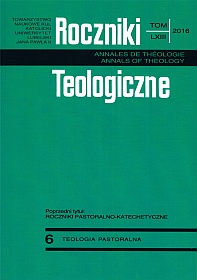Influence of the Second Vatican Council’s Apostolic Constitution Gaudium et Spes on Progress of the Pastoral Theology and Ministry
Abstract
The Apostolic constitution Gaudium et Spes is a groundbreaking moment. The novelty of this document lies in its inductive and pastoral approach to the relationship of the Church and the world. The pastoral nature of the Apostolic constitution Gaudium et Spes is based on the fact that not only God, but man as well as the world, are in the horizon of its preoccupation. Pastoral nature of the constitution is also seen in the way in which it is written as well as in the inductive presentation of its contents. The image of pastoral ministry which comes up from the constitution Gaudium et Spes is personalistic and universal. In this concept the pastoral ministry is the task of the entire Church and is realized for people and through people. The teaching of the constitution Gaudium et Spes has fundamental meaning for the relationship of the Church and the world. The Church’s ministry of salvation and its ministry toward the world are not excluded since the Church, while taking care for the salvation of the faithful, has to look to sanctification of the world.
References
Bielecki S., Teologia znaków czasu, Kielce: Wydawnictwo „Jedność” 2006.
Bielecki S., Znaki czasu i ich rozpoznawanie, w: R. Kamiński (red.), Teologia pastoralna, t. I, s. 228-247.
Cegiełka F., Chrześcijanin w świecie, w: Powołanie człowieka. Odpowiedzialni za świat, Poznań–Warszawa: Pallottinum 1982, s. 142-152.
Czaja A., Kościół, w: R. Kamiński, W. Przygoda, M. Fiałkowski (red.), Leksykon teologii pastoralnej, Lublin: TN KUL 2006, s. 399-405.
Fiałkowski M., Stosunek Kościoła do świata, w: R. Kamiński (red.), Teologia pastoralna, t. I, Lublin: Atla 2 2000, s. 249-292.
Florkowski E., Wprowadzenie do Konstytucji dogmatycznej o Kościele, w: Sobór Watykański II, Konstytucje, dekrety, deklaracje. Tekst polski, Poznań: Pallottinum 1968, s. 89-104.
Kamiński R., Sobór Watykański II – wydarzeniem i doktryną Kościoła, „Sacerdotalis institutio”, 2(1998), nr 1, s. 61-66.
Kamiński R., Wprowadzenie do teologii pastoralnej, Kraków: Wydawnictwo „M” 2001.
Kominek B., Znaczenie Konstytucji „Gaudium et spes” dla duszpasterstwa, „Znak”, 18(1966), nr 149(11), s. 1310-1318.
Majka J., Wprowadzenie do Konstytucji duszpasterskiej o Kościele w świecie współczesnym, w: Sobór Watykański II, Konstytucje, dekrety, deklaracje, Poznań: Pallottinum 1968, s. 521-536.
Nosowski Z., Polski (po)soborowy rachunek sumienia, w: K. Półtorak (red.), Recepcja Soboru. Niektóre wyzwania wobec życia i działania Kościoła 40 lat po Soborze Watykańskim II, Szczecin: Atla 2 2007, s. 29-56.
Piwowarski W. (red.), Słownik katolickiej nauki społecznej, Warszawa: Palabra 1993.
Sieg J., Refleksja Soboru nad obecnością Kościoła w świecie współczesnym, w: H. Bogacki, S. Moysa (red.), Kościół w świetle Soboru, Poznań: Księgarnia Św. Wojciecha 1968, s. 489-518.
Wal J., Duch dialogu, Kraków: Wydawnictwo „Czuwajmy” 2013.
Wojtyła K., Znaczenie Konstytucji pastoralnej dla teologów, „Collectanea Theologica”, 38(1968), f. 1, s. 5-18.
Copyright (c) 2016 Roczniki Teologiczne

This work is licensed under a Creative Commons Attribution-NonCommercial-NoDerivatives 4.0 International License.





